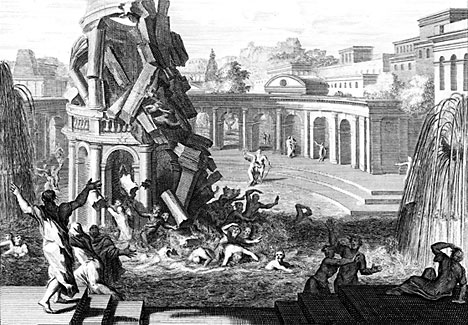Except Ye Repent
 You Shall Likewise Perish
You Shall Likewise Perish
Peter Leithart has posted a response from Joe Rigney concerning the meaning of Luke 12-13. We had a look at the structure of these chapters here recently (See 666 in the Gospel of Luke), so I thought it would be interesting to see how these two approaches “speak to each other.”
In 12:49-53, Jesus says that he’s come to cast fire on the earth and divide families. He goes on to make a point about his audience’s ability to discern weather: they recognize rain in the first clouds, and they recognize scorching heat in the first breeze from the south. The common point is that we recognize major weather events in their small precursors. We can see storms in seed form. The hypocrisy of the Jews was their unwillingness to apply this basic principle to judgments: They knew how to interpret the appearance of earth and sky, but not the present time (12:56). They had not learned the lesson of Amos 4:6-13: the famine, drought, blight, pestilence, and raids are simply the warm-up, the warning of what is to come if the people don’t repent. Failure to interpret the events and heed the warning will lead to the ultimate judgment: Prepare to meet your God.
Following this point through in Ch. 13, Jesus is telling them that the fall of the tower and the mixing of the blood is a precursor to a greater calamity for the whole nation. Pilate’s mingling of the blood is the cloud; the falling of the tower is the south wind. The desecration and destruction of AD 66-70 is the storm and the scorching heat. They’re drawing conclusions about the individuals involved instead of realizing that such calamities are a message to them, a merciful warning from God.
In this light, the intervening verses in 12:57-59 make sense. Israel is the accused on the way to the magistrate; judgment is coming. Now is the time to settle with the accuser, to make things right. Otherwise, you will pass through the full range of the court system: accuser, judge, and officer, and find yourself in prison until you can pay.
Thus, there’s a tight unity to Jesus’ entire discourse at this point, and one that ought to be instructive for us as we try to learn what it means to interpret the present time.
This is an important observation. It means that the “eternal” message behind Jesus’ words is secondary. This was not a threat that would be carried out at the end of history, but in the near future, the “soon” of Revelation 1:1-3.
Tying this to the Covenant-literary structure, we see the fall of the tower at Ascension as not only a great irony, but also a “promise.” Firstfruits is the “taste” of Pentecost, but it is also the promise of a greater harvest, a more mature on of grapes and olives, at Tabernacles. And what do we find at that point in the structure? Jesus weeping over not just the fall of a single tower (Covenant Head) but the entire Old Covenant Body, the city.
On the positive side, the Ascension of the true Firstfruits, Jesus, was also a sign of the coming rise of a New Covenant Body, pictured in the healing of the Woman who was bent over. The “uprightness” of Jesus as Head would be accounted to the Church through faith.
This “division” between the believers and unbelievers gives us the “plunder and plagues” at Maturity, the true Jews and the false Jews.
Now, does the historical fulfillment negate the use of Jesus’ warning today? Not at all. It demonstrates that God does work in history and that His judgment are just. Modern conservatives continue to overlook the first century significance of most of the New Testament, and keep peddling “application” as if it is interpretation. Consequently, the words of Jesus seem to have no power. They float somewhere in the sky, and will be irrelevant until the final judgment. This is a sad state of affairs. The fact that Jesus’ words came to pass in the Land means they will come to pass in the World. Joe’s final line is the best kind of application.

























